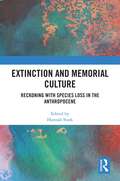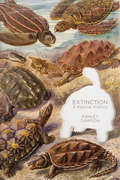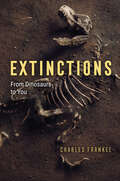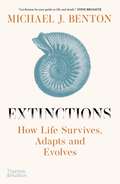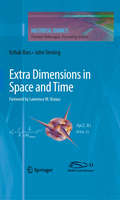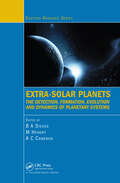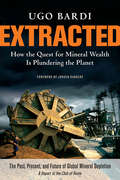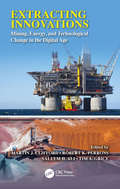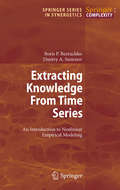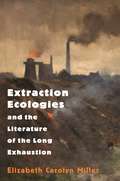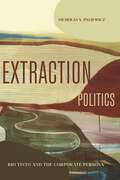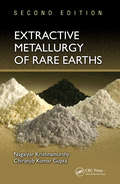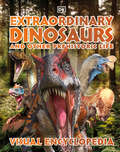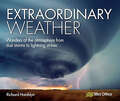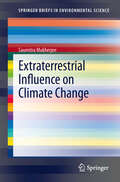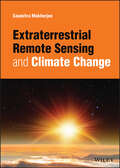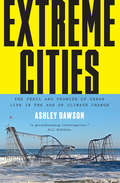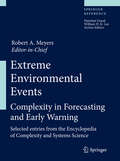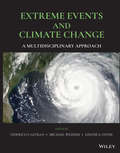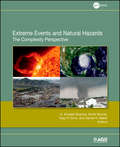- Table View
- List View
Extinction and Memorial Culture: Reckoning with Species Loss in the Anthropocene
by Hannah StarkThis book considers how we encounter and make meaning from extinction in diverse settings and cultures. It brings together an international and interdisciplinary range of scholars to consider how extinction is memorialised in museums and cultural institutions, through monuments, in literature and art, through public acts of ritual and protest, and in everyday practices. In an era in which species are becoming extinct at an unprecedented rate, we must find new ways to engage critically, creatively, and courageously with species loss. Extinction and Memorial Culture: Reckoning with Species Loss in the Anthropocene develops the conceptual tools to think in complex ways about extinctions and their aftermath, along with providing new insights into commemorating and mourning more-than-human lives. This book will be of great interest to students and scholars of the environmental humanities, extinction studies, memorial culture, and the Anthropocene.
Extinction: A Radical History
by Ashley DawsonSome thousands of years ago, the world was home to an immense variety of large mammals. From wooly mammoths and saber-toothed tigers to giant ground sloths and armadillos the size of automobiles, these spectacular creatures roamed freely. Then human beings arrived. Devouring their way down the food chain as they spread across the planet, they began a process of voracious extinction that has continued to the present.Headlines today are made by the existential threat confronting remaining large animals such as rhinos and pandas. But the devastation summoned by humans extends to humbler realms of creatures including beetles, bats and butterflies. Researchers generally agree that the current extinction rate is nothing short of catastrophic. Currently the earth is losing about a hundred species every day.This relentless extinction, Ashley Dawson contends in a primer that combines vast scope with elegant precision, is the product of a global attack on the commons, the great trove of air, water, plants and creatures, as well as collectively created cultural forms such as language, that have been regarded traditionally as the inheritance of humanity as a whole.This attack has its genesis in the need for capital to expand relentlessly into all spheres of life. Extinction, Dawson argues, cannot be understood in isolation from a critique of our economic system. To achieve this we need to transgress the boundaries between science, environmentalism and radical politics. Extinction: A Radical History performs this task with both brio and brilliance.
Extinctions: From Dinosaurs to You
by Charles FrankelA compelling answer to an important question: Can past mass extinctions teach us how to avoid future planetary disaster? On its face, the story of mass extinction on Earth is one of unavoidable disaster. Asteroid smashes into planet; goodbye dinosaurs. Planetwide crises seem to be beyond our ability to affect or evade. Extinctions argues that geological history tells an instructive story, one that offers important signs for us to consider. When the asteroid struck, Charles Frankel explains, it set off a wave of cataclysms that wore away at the global ecosystem until it all fell apart. What if there had been a way to slow or even turn back these tides? Frankel believes that the answer to this question holds the key to human survival. Human history, from the massacre of Ice Age megafauna to today’s industrial climate change, has brought the planet through another series of cataclysmic events. But the history of mass extinction together with the latest climate research, Frankel maintains, shows us a way out. If we curb our destructive habits, particularly our drive to kill and consume other species, and work instead to conserve what biodiversity remains, the Earth might yet recover. Rather than await decisive disaster, Frankel argues that we must instead take action to reimagine what it means to be human. As he eloquently explains, geological history reminds us that life is not eternal; we can disappear, or we can become something new and continue our evolutionary adventure.
Extinctions: How Life Survives, Adapts And Evolves
by Michael J. BentonA journey through the great mass extinction events that have shaped our Earth. This timely and original book lays out the latest scientific understanding of mass extinction on our planet. Cutting-edge techniques across biology, chemistry, physics, and geology have transformed our understanding of the deep past, including the discovery of a previously unknown mass extinction. This compelling evidence, revealing a series of environmental crises resulting in the near collapse of life on Earth, illuminates our current dilemmas in exquisite detail. Beginning with the oldest, Professor Michael J. Benton takes us through the “big five” die outs: the Late Ordovician, which set the evolution of the first animals on an entirely new course; the Late Devonian, apparently brought on by global warming; the cataclysmic End-Permian, also known as the Great Dying, which wiped out over 90 percent of alllife on Earth; the newly discovered Carnian Pluvial Event; and the End-Cretaceous asteroid. He examines how global warming, acid rain, ocean acidification, erupting volcanoes, and meteorite impact have affected conditions on Earth, and how life survived, adapted, and evolved. Benton’s expert retelling of scientific breakthroughs in paleobiology is illustrated throughout with photographs of fossils and fieldwork, and artistic reconstructions of ancient environments. In Extinctions, readers will learn about revolutionary new tools used to uncover ancient extinction events and processes in forensic detail, and how scientists are improving our understanding of the deep past. New research allows us to link long-ago upheavals to crises in our current age, the Anthropocene, with important consequences for us all.
Extra Dimensions in Space and Time
by Lawrence Krauss John Terning Farzad Nekoogar Itzhak BarsIn physics, the idea of extra spatial dimensions originates from Nordstöm's 5-dimensional vector theory in 1914, followed by Kaluza-Klein theory in 1921, in an effort to unify general relativity and electromagnetism in a 5 dimensional space-time (4 dimensions for space and 1 for time). Kaluza-Klein theory didn't generate enough interest with physicist for the next five decades, due to its problems with inconsistencies. With the advent of supergravity theory (the theory that unifies general relativity and supersymmetry theories) in late 1970's and eventually, string theories (1980s) and M-theory (1990s), the dimensions of space-time increased to 11 (10-space and 1-time dimension). There are two main features in this book that differentiates it from other books written about extra dimensions: The first feature is the coverage of extra dimensions in time (Two Time physics), which has not been covered in earlier books about extra dimensions. All other books mainly cover extra spatial dimensions. The second feature deals with level of presentation. The material is presented in a non-technical language followed by additional sections (in the form of appendices or footnotes) that explain the basic equations and formulas in the theories. This feature is very attractive to readers who want to find out more about the theories involved beyond the basic description for a layperson. The text is designed for scientifically literate non-specialists who want to know the latest discoveries in theoretical physics in a non-technical language. Readers with basic undergraduate background in modern physics and quantum mechanics can easily understand the technical sections. Part I starts with an overview of the Standard Model of particles and forces, notions of Einstein's special and general relativity, and the overall view of the universe from the Big Bang to the present epoch, and covers Two-Time physics. 2T-physics has worked correctly at all scales of physics, both macroscopic and microscopic, for which there is experimental data so far. In addition to revealing hidden information even in familiar "everyday" physics, it also makes testable predictions in lesser known physics regimes that could be analyzed at the energy scales of the Large Hadron Collider at CERN or in cosmological observations." Part II of the book is focused on extra dimensions of space. It covers the following topics: The Popular View of Extra Dimensions, Einstein and the Fourth Dimension, Traditional Extra Dimensions, Einstein's Gravity, The Theory Formerly Known as String, Warped Extra Dimensions, and How Do We Look For Extra Dimensions?
Extra-Solar Planets: The Detection, Formation, Evolution and Dynamics of Planetary Systems
by B A Steves M Hendry A C CameronSince the discovery of the first exoplanet orbiting a main sequence star in 1995, nearly 500 planets have been detected, with this number expected to increase dramatically as new ground-based planetary searches begin to report their results. Emerging techniques offer the tantalizing possibility of detecting an Earth-mass planet in the habitable zon
Extracted
by Jorgen Randers Ugo BardiAs we dig, drill, and excavate to unearth the planet's mineral bounty, the resources we exploit from ores, veins, seams, and wells are gradually becoming exhausted. Mineral treasures that took millions, or even billions, of years to form are now being squandered in just centuries-or sometimes just decades. Will there come a time when we actually run out of minerals? Debates already soar over how we are going to obtain energy without oil, coal, and gas. But what about the other mineral losses we face? Without metals, and semiconductors, how are we going to keep our industrial system running? Without mineral fertilizers and fuels, how are we going to produce the food we need?Ugo Bardi delivers a sweeping history of the mining industry, starting with its humble beginning when our early ancestors started digging underground to find the stones they needed for their tools. He traces the links between mineral riches and empires, wars, and civilizations, and shows how mining in its various forms came to be one of the largest global industries. He also illustrates how the gigantic mining machine is now starting to show signs of difficulties. The easy mineral resources, the least expensive to extract and process, have been mostly exploited and depleted. There are plenty of minerals left to extract, but at higher costs and with increasing difficulties.The effects of depletion take different forms and one may be the economic crisis that is gripping the world system. And depletion is not the only problem. Mining has a dark side-pollution-that takes many forms and delivers many consequences, including climate change. The world we have been accustomed to, so far, was based on cheap mineral resources and on the ability of the ecosystem to absorb pollution without generating damage to human beings. Both conditions are rapidly disappearing. Having thoroughly plundered planet Earth, we are entering a new world. Bardi draws upon the world's leading minerals experts to offer a compelling glimpse into that new world ahead.
Extracting Innovations: Mining, Energy, and Technological Change in the Digital Age
by Martin J. Clifford, Robert K. Perrons, Saleem H. Ali and Tim A. GriceThis book considers the most contemporary innovations propelling the extractive industries forward while also creating new environmental and social challenges. The socio-ecological fabric of innovation in the extractive industries is considered through an integrative approach that brings together engineers, natural scientists, and social scientists—academics and practitioners—giving an empirically grounded and realistic evaluation of the innovations in this sector. It synthesizes a series of questions including:
Extracting Knowledge From Time Series: An Introduction to Nonlinear Empirical Modeling
by Boris P. Bezruchko Dmitry A. SmirnovThis book addresses the fundamental question of how to construct mathematical models for the evolution of dynamical systems from experimentally-obtained time series. It places emphasis on chaotic signals and nonlinear modeling and discusses different approaches to the forecast of future system evolution. In particular, it teaches readers how to construct difference and differential model equations depending on the amount of a priori information that is available on the system in addition to the experimental data sets. This book will benefit graduate students and researchers from all natural sciences who seek a self-contained and thorough introduction to this subject.
Extraction Ecologies and the Literature of the Long Exhaustion
by Elizabeth Carolyn MillerHow literature of the British imperial world contended with the social and environmental consequences of industrial miningThe 1830s to the 1930s saw the rise of large-scale industrial mining in the British imperial world. Elizabeth Carolyn Miller examines how literature of this era reckoned with a new vision of civilization where humans are dependent on finite, nonrenewable stores of earthly resources, and traces how the threatening horizon of resource exhaustion worked its way into narrative form.Britain was the first nation to transition to industry based on fossil fuels, which put its novelists and other writers in the remarkable position of mediating the emergence of extraction-based life. Miller looks at works like Hard Times, The Mill on the Floss, and Sons and Lovers, showing how the provincial realist novel’s longstanding reliance on marriage and inheritance plots transforms against the backdrop of exhaustion to withhold the promise of reproductive futurity. She explores how adventure stories like Treasure Island and Heart of Darkness reorient fictional space toward the resource frontier. And she shows how utopian and fantasy works like “Sultana’s Dream,” The Time Machine, and The Hobbit offer imaginative ways of envisioning energy beyond extractivism.This illuminating book reveals how an era marked by violent mineral resource rushes gave rise to literary forms and genres that extend extractivism as a mode of environmental understanding.
Extraction Politics: Rio Tinto and the Corporate Persona (RSA Series in Transdisciplinary Rhetoric)
by Nicholas S. PaliewiczAn investigation into one of the largest and most lucrative mineral mining companies in the world, Rio Tinto, Extraction Politics reveals how the company constructs a presence in the places it operates and shapes meanings and orientations toward the environment. Taking readers on a “rhetorical pilgrimage” across the American Southwest, Nicholas Paliewicz shows how Rio Tinto creates adaptable corporate identities. From Ronald Reagan’s frontiersman advertisements for the Borax Mine in California to the pioneer Mormon persona at Bingham Canyon Mine in Salt Lake City and the folksy, paternalistic perspective toward the San Carlos Apache at the proposed mine at Oak Flat, Arizona, the company appropriates local history to embed itself as a valued member of the public—without having to settle in those ecological communities and bear the costs of extraction. This does not occur without resistance, however. Paliewicz also shows how activists use these same tactics to expose Rio Tinto as an exploitative, colonialist polluter.In an era of surging demand for dwindling supplies of minerals and metals, this book previews what the future of extractivism may look like. Extraction Politics will appeal to scholars and students of environmental communication and activist politics as well as general readers interested in the climate crisis.
Extractive Metallurgy of Rare Earths
by Nagaiyar Krishnamurthy Chiranjib Kumar GuptaNew Edition Now Covers Recycling, Environmental Issues, and Analytical DeterminationEmploying four decades of experience in the rare metal and rare earths industry, the authors of Extractive Metallurgy of Rare Earths, Second Edition present the entire subject of rare earth elements with depth and accuracy. This second edition updates the most impor
Extraordinary Dinosaurs and Other Prehistoric Life Visual Encyclopedia
by DKDiscover more than 100 dinosaurs and other prehistoric animals in this exciting children&’s dinosaur encyclopedia! Extraordinary Dinosaurs Visual Encyclopedia is the perfect book for young readers who want to get up close and personal with their favourite prehistoric creatures! Children will be excited to see the fastest, largest, and fiercest creatures, browse their habitats, learn about their claws and spikes, and find out how their fossils help scientists piece together hidden clues about their lives.This must-have dinosaur book for children aged 7–11 features fascinating information on all the major types of dinosaur as well as ancient fish, other prehistoric reptiles in the air or water, and early mammals. Kids will be drawn in and mesmerized by hundreds of exciting images and surprising information on many different dinosaur profiles.Inside the pages of this thrilling dinosaur book for kids, you&’ll find:- More than 100 profiles on dinosaurs and other prehistoric creatures- Fact-filled &‘top trump&’ style profiles on remarkable dinosaurs and other prehistoric creatures- Chapters that span time before the dinosaurs, the age of the dinosaurs, and life after many dinosaurs died out- Clear, engaging text packed with latest facts alongside stunning CGI visuals and artworksThis is the ultimate fact-filled dinosaur reference book for kids who love to have all the latest, weirdest, most in-depth info on the creatures of the prehistoric world at their fingertips. Dinosaur reconstructions and the latest fossil finds bring back to life the bone-crunching teeth of the Tyrannosaurus rex, the astonishingly large body of the Argentinosaurus, and the plane-sized wings of the soaring Hatzegopteryx. Each page reveals new facts from the latest paleontological research, including each animal&’s size, group, habitat, time period, diet, and fossil discovery.
Extraordinary Projects for Ordinary People: Do-It-Yourself Ideas from the People Who Actually Do Them
by Instructables. Com Noah WeinsteinCollected in this volume is a best-of selection from Instructables, reproduced for the first time outside of the web format, retaining all of the charm and ingenuity that make Instructables such a popular destination for internet users looking for new and fun projects designed by real people in an easy-to-digest way. <p><p> Hundreds of Instructables are included, ranging from practical projects like making a butcher block counter top or building solar panels to fun and unique ideas for realistic werewolf costumes or transportable camping hot tubs. The difficulty of the projects ranges from beginner on up, but all are guaranteed to raise a smile or a “Why didn’t I think of that?” <p> Numerous full-color pictures accompany each project, detailing each step of the process along the way. It’s an invitation to try a few yourself, and once you’re done, see if you don’t have a couple of ideas to share at Instructables.com.
Extraordinary Weather: Wonders of the Atmosphere from Dust Storms to Lightning Strikes
by Richard HamblynAn incredible collection of truly breathtaking weather phenomena. Produced in association with the Met Office, the world's premier weather forecasting bureau,Extraordinary Weatherunearths astonishing photographs and compelling satellite imagery that reveals the otherworldly, wayward and often ambiguous nature of the weather. From the beautiful snow rollers that can form on icy rooftops to the dramatic lightshow of volcanic lightning, these powerful images - accompanied by commentary from the award winning Richard Hamblyn - inform and explain the science behind the most extraordinary weather phenomena ever seen. Extraordinary Weatherpresents a beautiful and dramatic visual exhibition of the perpetually changing sky, bringing us closer to the natural world. Discover the world's altering climate and its affects all around us, explore weather events on a larger scale through powerful satellite imagery, and learn of unusual and out of the ordinary weather phenomena considered unbelievable until you have seen them with your own eyes. Acclaimed author Richard Hamblyn celebrates both impressive natural and man-made weather wonders from frost feathers created by rime ice to wingtip vortices formed by accelerating aircraft. The six themed chapters of the book explore storms and tempests, ice and snow, heat and drought, atmospherics, strange phenomena and man-made weather revealed through some of the most visually stunning and intriguing photographs and satellite images seen yet.
Extraterrestrial Influence on Climate Change
by Saumitra MukherjeeClimate change has been addressed since last decade based on the influence of human activities like production of industrial effluents, land use changes and other activities due to development of the society. These are very important issues no doubt but the activities due to the influence of extraterrestrial phenomena have not been given its due importance. An attempt is being made here to understand the influence of extraterrestrial activities as one of the important factors of climate change has been attempted here. The influence of Sun and distant stars on the environment of the earth has been studied during the cyclic changes in the Sun as well as episodic changes in the environment due to the effect of other celestial objects in between Sun-Earth environment. The study has been carried out based on the changes within the Sun as well as changes during the solar eclipse. During these extraterrestrial changes it has been observed that the earth changes in its atmosphere as well as geosphere, which may have local effect but the increase of these local effect in large scale may contribute to the climate change. Solar radiation drives atmospheric circulation. Since solar radiation represents almost all the energy available to the Earth, accounting for solar radiation and how it interacts with the atmosphere and the Earth's surface is fundamental to understanding the Earth's energy budget.
Extraterrestrial Remote Sensing and Climate Change
by Saumitra MukherjeeExtraterrestrial Remote Sensing and Climate Change Thought provoking treatise that aims to answer questions about Earth’s environment based on research done through remote sensing techniques In Extraterrestrial Remote Sensing and Climate Change, the author addresses longstanding questions about a possible correlation between fluctuations in solar activity and changes in the Earth’s atmosphere and geosphere that have been observed during periods of extraterrestrial changes such as solar eclipses or solar storms. The author goes on to suggest possible mechanisms for anomalies seen in climate change and other environmental effects through a deep examination of interdisciplinary research. Core topics covered in the work include: Data from ground-based detectors and from the Solar and Heliospheric Observatory (SOHO) satellite, which monitor solar activity Key variables associated with sunspot eruption, such as electron flux, proton flux, X-ray flux, and planetary indices Observable changes in other planets and their moons, as well as in cosmic radiation from beyond the sun Extraterrestrial effects on the Earth’s magnetic field and on seismic activity With its fresh and multidisciplinary approach, Extraterrestrial Remote Sensing and Climate Change is a thought-provoking treatise for students, researchers, and professionals in the fields of environmental science and climate science.
Extraterrestrial Seismology
by Vincent C. H. Tong Rafael A. GarcíaSeismology is a highly effective tool for investigating the internal structure of the Earth. Similar techniques have also successfully been used to study other planetary bodies (planetary seismology), the Sun (helioseismology), and other stars (asteroseismology). Despite obvious differences between stars and planetary bodies, these disciplines share many similarities and together form a coherent field of scientific research. This unique book takes a transdisciplinary approach to seismology and seismic imaging, reviewing the most recent developments in these extraterrestrial contexts. With contributions from leading scientists, this timely volume systematically outlines the techniques used in observation, data processing, and modelling for asteroseismology, helioseismology, and planetary seismology, drawing comparisons with seismic methods used in geophysics. Important recent discoveries in each discipline are presented. With an emphasis on transcending the traditional boundaries of astronomy, solar, planetary and Earth sciences, this novel book is an invaluable resource and reference for undergraduates, postgraduates and academics.
Extremal Polynomials and Riemann Surfaces
by Andrei Bogatyrev Nikolai KruzhilinThe problems of conditional optimization of the uniform (or C-) norm for polynomials and rational functions arise in various branches of science and technology. Their numerical solution is notoriously difficult in case of high degree functions. The book develops the classical Chebyshev's approach which gives analytical representation for the solution in terms of Riemann surfaces. The techniques born in the remote (at the first glance) branches of mathematics such as complex analysis, Riemann surfaces and Teichmüller theory, foliations, braids, topology are applied to approximation problems. The key feature of this book is the usage of beautiful ideas of contemporary mathematics for the solution of applied problems and their effective numerical realization. This is one of the few books where the computational aspects of the higher genus Riemann surfaces are illuminated. Effective work with the moduli spaces of algebraic curves provides wide opportunities for numerical experiments in mathematics and theoretical physics.
Extreme 3-D: Sharks
by Nancy HonovichGo face-to-face with the world's most awesome predators! Extreme 3-D: Sharks is packed with incredible 3-D photos of the most fasincating creatures in the sea!
Extreme 3-D: Wild Weather
by Jackie BallExperience the most awesome power on Earth: wild weather! From destructive thunderstorms to devistating tornados, wild weather can appear out of nowhere and uproot trees, tear apart houses, and bring cities to a standstill. Extreme 3-D: Wild Weather is packed with dramatic 3-D photos and the insight you need to understand droughts, ice storms, tsunamis, and more.
Extreme Cities: The Peril and Promise of Urban Life in the Age of Climate Change
by Ashley DawsonA cutting exploration of how cities drive climate change while being on the frontlines of the coming climate crisisHow will climate change affect our lives? Where will its impacts be most deeply felt? Are we doing enough to protect ourselves from the coming chaos? In Extreme Cities, Ashley Dawson argues that cities are ground zero for climate change, contributing the lion’s share of carbon to the atmosphere, while also lying on the frontlines of rising sea levels. Today, the majority of the world’s megacities are located in coastal zones, yet few of them are adequately prepared for the floods that will increasingly menace their shores. Instead, most continue to develop luxury waterfront condos for the elite and industrial facilities for corporations. These not only intensify carbon emissions, but also place coastal residents at greater risk when water levels rise.In Extreme Cities, Dawson offers an alarming portrait of the future of our cities, describing the efforts of Staten Island, New York, and Shishmareff, Alaska residents to relocate; Holland’s models for defending against the seas; and the development of New York City before and after Hurricane Sandy. Our best hope lies not with fortified sea walls, he argues. Rather, it lies with urban movements already fighting to remake our cities in a more just and equitable way.As much a harrowing study as a call to arms Extreme Cities is a necessary read for anyone concerned with the threat of global warming, and of the cities of the world.
Extreme Environmental Events: Complexity in Forecasting and Early Warning
by Robert A. MeyersExtreme Environmental Events is an authoritative single source for understanding and applying the basic tenets of complexity and systems theory, as well as the tools and measures for analyzing complex systems, to the prediction, monitoring, and evaluation of major natural phenomena affecting life on earth. These phenomena are often highly destructive, and include earthquakes, tsunamis, volcanoes, climate change,, and weather. Early warning, damage, and the immediate response of human populations to these phenomena are also covered from the point of view of complexity and nonlinear systems. In 61 authoritative, state-of-the art articles, world experts in each field apply such tools and concepts as fractals, cellular automata, solitons game theory, network theory, and statistical physics to an understanding of these complex geophysical phenomena.
Extreme Events and Climate Change: A Multidisciplinary Approach (Geophysical Monograph Series)
by Federico Castillo Michael Wehner Dáithí A. StoneAn authoritative volume focusing on multidisciplinary methods to estimate the impacts of climate-related extreme events to society As the intensity and frequency of extreme events related to climate change continue to increase, there is an urgent need for clear and cohesive analysis that integrates both climatological and socioeconomic impacts. Extreme Events and Climate Change provides a timely, multidisciplinary examination of the impacts of extreme weather under a warming climate. Offering wide-ranging coverage of the methods and analysis that relate changes in extreme events to their societal impacts, this volume helps readers understand and overcome the methodological challenges associated with extreme event analysis. Contributions from leading experts from across disciplines describe the theoretical requirements for analyzing the complex interactions between meteorological phenomena and the resulting outcomes, discuss new approaches for analyzing the impacts of extreme events on society, and illustrate how empirical and theoretical concepts merge to form a unified plan that enables informed decision making. Throughout the text, innovative frameworks allow readers to find solutions to the modeling and statistical challenges encountered when analyzing extreme events. Designed for researchers and policy makers alike, this important resource: Discusses topics central to understanding how extreme weather changes as the climate warms Provides coverage of analysis methods that relate changes in extreme events to their societal impacts Reviews significant theoretical and modeling advances in the physical aspects of climate science Presents a comprehensive view of state of the science, including new ways of using data from different sources Extreme Events and Climate Change: A Multidisciplinary Approach is an indispensable volume for students, researchers, scientists, and practitioners in fields such as hazard and risk analysis, climate change, atmospheric and ocean sciences, hydrology, geography, agricultural science, and environmental and space science.
Extreme Events and Natural Hazards
by Vijay P. Dimri Daniel N. Baker A. Surjalal Sharma Armin BundePublished by the American Geophysical Union as part of the Geophysical Monograph Series, Volume 196.Extreme Events and Natural Hazards: The Complexity Perspective examines recent developments in complexity science that provide a new approach to understanding extreme events. This understanding is critical to the development of strategies for the prediction of natural hazards and mitigation of their adverse consequences. The volume is a comprehensive collection of current developments in the understanding of extreme events. The following critical areas are highlighted: understanding extreme events, natural hazard prediction and development of mitigation strategies, recent developments in complexity science, global change and how it relates to extreme events, and policy sciences and perspective. With its overarching theme, Extreme Events and Natural Hazards will be of interest and relevance to scientists interested in nonlinear geophysics, natural hazards, atmospheric science, hydrology, oceanography, tectonics, and space weather.
